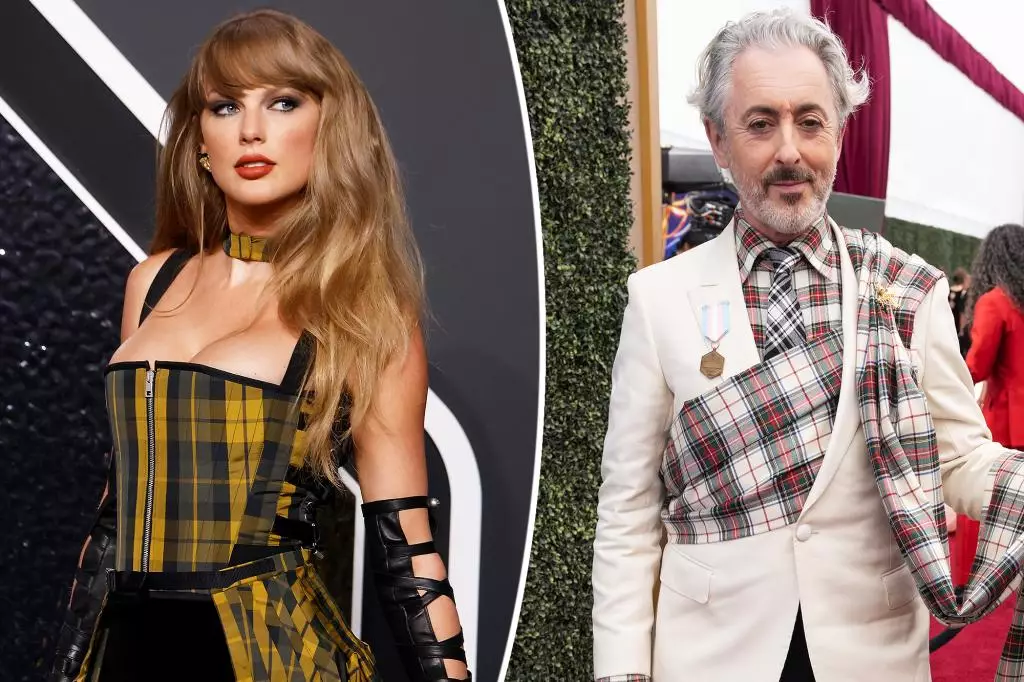The intersection of fashion and celebrity culture is always a scintillating spectacle, especially at major events like the Emmy Awards. This year, 2024 saw Alan Cumming, the talented host of the peabody-award-winning show “The Traitors,” grace the event with an ensemble that would make any fashionista take notice. As he stepped onto the red carpet, Cumming’s outfit—the matrimonial blend of Scottish heritage and contemporary fashion—sparked a lively conversation about style, identity, and inspiration among the stars.
Alan Cumming’s choice of clothing is indicative of his artistic flair. His beige jacket and black kilt, designed by Teddy Vonranson, were not mere articles of clothing but rather an extension of his persona, a visual testament to his Scottish roots. Layered underneath was a tartan shirt in green and red, a playful nod to his heritage that remained eternal in his fashion repertoire. The addition of a matching black and white tie completed the ensemble, allowing him to subtly flaunt his unique blend of tradition and modernity. Interestingly, the look wasn’t just a solo act; it resonated with the recent fashion statements made at other glamorous events, including a striking resemblance to Taylor Swift’s yellow plaid ensemble from the MTV VMAs.
Cumming’s playfully candid remark about Swift, where he jested, “The bitch stole my look,” highlighted an essential truth in the fashion world: imitation is indeed a form of flattery. It’s humorous yet revealing when two public figures, spanning genres like film and music, create parallels through their style choices. This live commentary added a layer of entertainment beyond the typical award show fare; it showcased how interconnected and influential celebrity culture is in shaping public perceptions of fashion. Cumming’s cheeky social media presence turned the tables, flipping a side-by-side meme into an opportunity to address Swift directly, illuminating the playful competition that often underpins celebrity style.
Cumming’s witty commentary led to a rich tapestry of fan engagement on social media. Comment sections turned into a melting pot of opinions and speculations about the nature of Cumming’s connection to Swift’s look, with fans enthusiastically wondering if there might be a deeper Easter egg hinting at collaboration or upcoming television appearances. There is a palpable excitement within audiences for discussions that blur the lines between different forms of entertainment, creating a sense of communal investment in celebrities’ journeys through fashion.
The connection between fashion and identity extends to the very core of “The Traitors,” a show that expertly intertwines strategy, drama, and competition. Cumming praised the show’s unique premise while taking the opportunity to express gratitude for its reception, which culminated in its first-ever Emmy for outstanding reality competition. With the announcement of the upcoming seasons, anticipation is high—a sentiment perfectly encapsulated by Cumming’s admission that the thematic stitching of each episode’s look not only adds a layer of visual interest but also elevates the narrative’s dramatic appeal.
As Cumming gears up for future seasons of “The Traitors,” the excitement is palpable, especially for viewers who enjoy the symbiosis of narrative and dress. He emphasizes how the costume gives life to the dramatic plots of the series, allowing him to immerse himself fully in the theatrics at play. This vibrant integration of fashion and storytelling is crucial not just for the entertainment industry but for societal norms regarding expression and creativity.
Ultimately, Alan Cumming’s appearance at the 2024 Emmy Awards served as a rich chapter in the ongoing narrative of celebrity fashion. His unique ensemble stood as a celebration of individuality, cultural heritage, and the interconnectedness of influencers across different artistic realms. From joking about a potential rivalry with Taylor Swift to setting the tone for what’s to come in “The Traitors,” Cumming demonstrates that, in the world of glitz and glamour, each outfit is not just a choice but an expression of a larger conversation about who we are and those with whom we share the stage.

